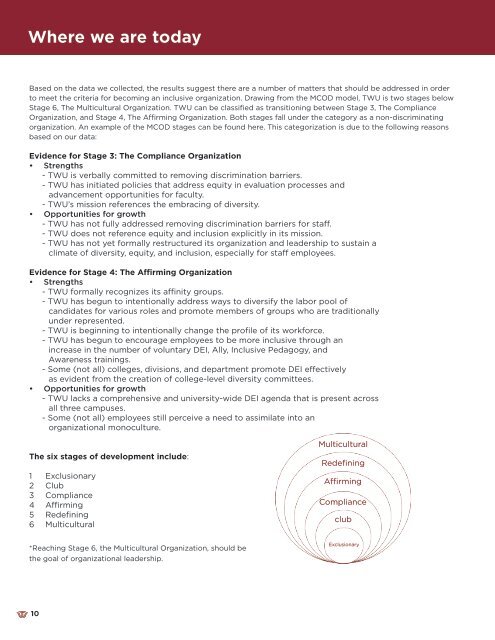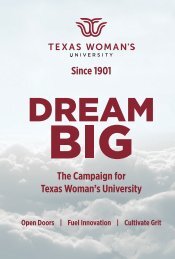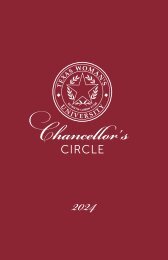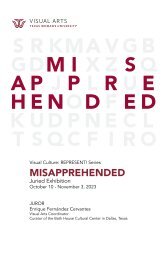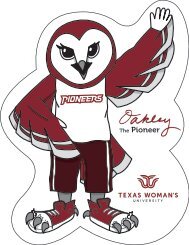Diversity, Equity and Inclusion Annual Report 2022
You also want an ePaper? Increase the reach of your titles
YUMPU automatically turns print PDFs into web optimized ePapers that Google loves.
Where we are today<br />
Based on the data we collected, the results suggest there are a number of matters that should be addressed in order<br />
to meet the criteria for becoming an inclusive organization. Drawing from the MCOD model, TWU is two stages below<br />
Stage 6, The Multicultural Organization. TWU can be classified as transitioning between Stage 3, The Compliance<br />
Organization, <strong>and</strong> Stage 4, The Affirming Organization. Both stages fall under the category as a non-discriminating<br />
organization. An example of the MCOD stages can be found here. This categorization is due to the following reasons<br />
based on our data:<br />
Evidence for Stage 3: The Compliance Organization<br />
• Strengths<br />
- TWU is verbally committed to removing discrimination barriers.<br />
- TWU has initiated policies that address equity in evaluation processes <strong>and</strong><br />
advancement opportunities for faculty.<br />
- TWU’s mission references the embracing of diversity.<br />
• Opportunities for growth<br />
- TWU has not fully addressed removing discrimination barriers for staff.<br />
- TWU does not reference equity <strong>and</strong> inclusion explicitly in its mission.<br />
- TWU has not yet formally restructured its organization <strong>and</strong> leadership to sustain a<br />
climate of diversity, equity, <strong>and</strong> inclusion, especially for staff employees.<br />
Evidence for Stage 4: The Affirming Organization<br />
• Strengths<br />
- TWU formally recognizes its affinity groups.<br />
- TWU has begun to intentionally address ways to diversify the labor pool of<br />
c<strong>and</strong>idates for various roles <strong>and</strong> promote members of groups who are traditionally<br />
under represented.<br />
- TWU is beginning to intentionally change the profile of its workforce.<br />
- TWU has begun to encourage employees to be more inclusive through an<br />
increase in the number of voluntary DEI, Ally, Inclusive Pedagogy, <strong>and</strong><br />
Awareness trainings.<br />
- Some (not all) colleges, divisions, <strong>and</strong> department promote DEI effectively<br />
as evident from the creation of college-level diversity committees.<br />
• Opportunities for growth<br />
- TWU lacks a comprehensive <strong>and</strong> university-wide DEI agenda that is present across<br />
all three campuses.<br />
- Some (not all) employees still perceive a need to assimilate into an<br />
organizational monoculture.<br />
The six stages of development include:<br />
1 Exclusionary<br />
2 Club<br />
3 Compliance<br />
4 Affirming<br />
5 Redefining<br />
6 Multicultural<br />
Multicultural<br />
Redefining<br />
Affirming<br />
Compliance<br />
club<br />
*Reaching Stage 6, the Multicultural Organization, should be<br />
the goal of organizational leadership.<br />
Exclusionary<br />
10


